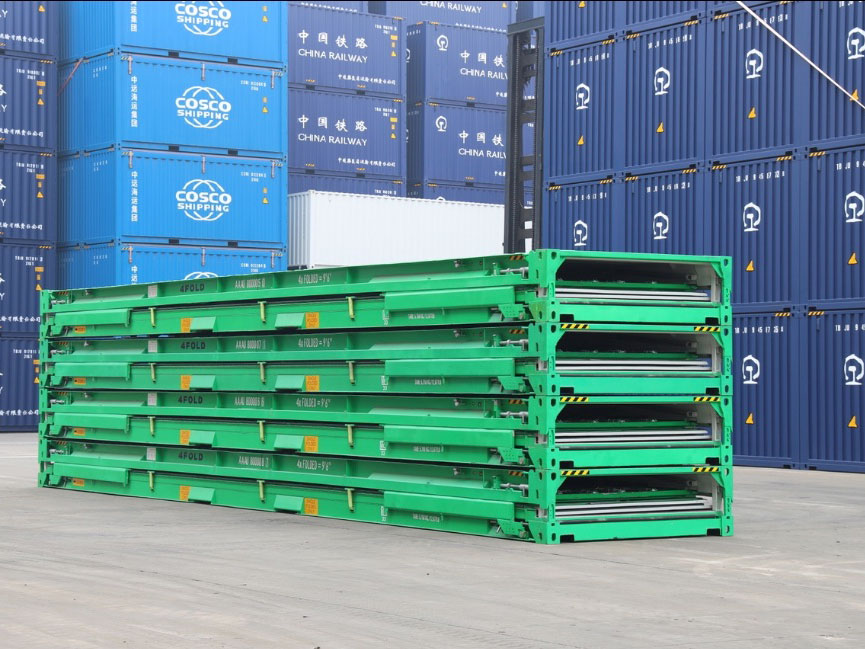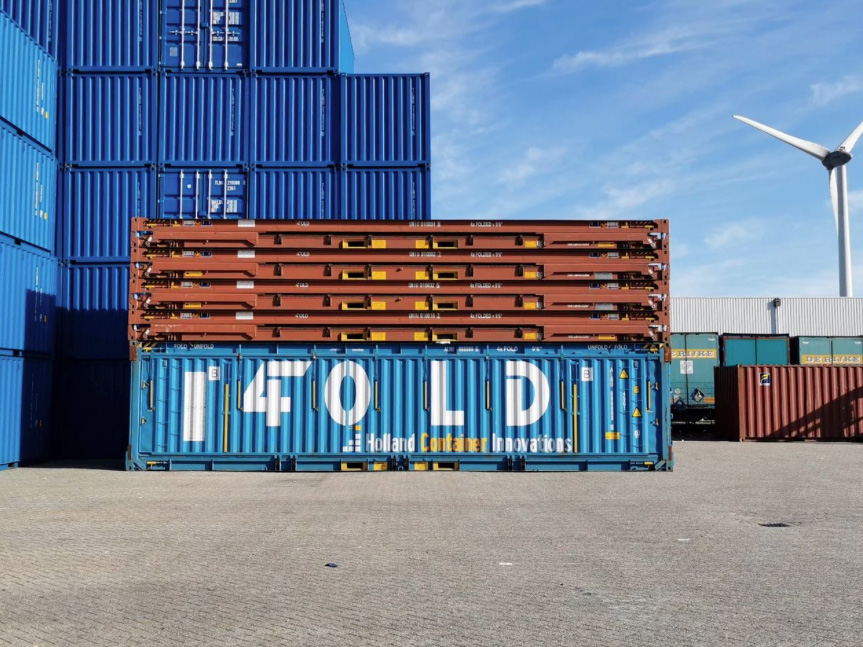4FOLD Containers will compress four empties into one unit to be tested in Shanghai-Chicago-Shanghai experiment
A new Dutch foldable container technology will be tested in Chicago in 2022 that could demonstrate how to reduce empty container handling moves at ports for trucking and rail while reducing the need for empty container storage at container terminals and on ships.
In an interview, Broekhuis told AJOT the new 4FOLD containers will be deployed to transport imported goods from Shanghai through either the Port of Seattle or the Port Vancouver and then moved by rail to Chicago.
Once four import containers have been unloaded, they will be folded, using a forklift machine, into the space of a single 40-foot unit container, loaded onto a truck, trucked to a rail yard in the Chicago area, loaded onto a rail car, as a single 40-foot unit, and shipped by rail to either Seattle or Vancouver for transport by ocean carrier back to Shanghai.

With the current disposition of empty containers playing a major role in slowing down cargo-handling operations at major ports, including Los Angeles and Long Beach, the ability to compress 4 empty containers into one unit for return to Asia represents a huge savings for:
- Truck drivers required to move empties
- Rail cars needed to move intermodal empties back to the ports
- Reduction in empty storage space at container terminals when four empties can be stored as one
- Reduction of empty container space needed on ocean carriers
- Less container moves by all supply chain partners
The expected cost of the 4FOLD will be higher than for standard forty-foot containers but the savings in container handling moves plus the projected increase in cargo-handling velocity could not come at a more opportune time. There is a dire need to reduce the current container-handling log jams being experienced at ports, rail depots and with harbor trucking around the United States.
Broekhuis said that 4FOLD, based in Delft in the Netherlands, has been tested in a service with Procter & Gamble (P&G) since 2020: “In November 2020, P&G announced a partnership with 4FOLD to ship foldable containers with several shipping lines including Shanghai to Cyprus and another route including South Africa.”
In addition, a letter of intent “with a corporate customer was signed for a bundle of containers from Barcelona to South Africa with the 4FOLD containers. The main reason for the agreement is CO2 reduction.”

Broekhuis says the logistics’ problem that the 4FOLD technology seeks to address is that there are “Over 800 million container movements per year in the world” with the result that:
- 20% of containers on ships at sea are empty
- 40% on containers on land are empty
This results, he says, is that “there are 200 million empty container moves transporting nothing but air.”
C02 Reduction
The impact on ocean carriers and shippers worldwide is:
- Up to 200 million tons of CO2 emissions
- $25 Billion U.S. per year in transport costs
The 4FOLD containers can cut those costs and can reduce congestion and emission problems:
- One truck driver can return four empty 4FOLDs back to the port as opposed to 4 drivers transporting conventional empties
- One rail car can transport four empty 4FOLDS back to port on instead of two rail cars double-stacked
The 4FOLD container “can be folded to 25% of its volume” with the result that:
- 4 folded containers become one interconnected bundle that is handled like one container
- Folding/unfolding can be done with fork-lifts or other container handling machinery in less than 10 minutes
Broekhuis says that an emission reduction comparison based on standard empty containers versus four 4FOLD containers showed the 4FOLD technology generated a substantial emission reduction for ships and trucks:
- 24% to 25% emission reduction for trucks in Europe and China
- 38% emission reduction for a container ship service between China and Europe
The comparison was calculated by EcoTransit World.
The 4FOLD process has already gone through substantial testing and certifications utilizing 11 patents and has been tested and approved:
- By 15 shipping lines and shippers at 60 depots and harbors in the world
- Approved by UIC (International Union of Railways) and the Association of American Railways (AAR)
- The container is the first fully ISO (International Organization for Standardization) foldable 40 ft HC container in the world
- The technology has also received the Safety Approval Plate (CSC plate), a legal requirement for all active intermodal shipping containers
Background
Holland Container Innovations developed the 4FOLD technology as a spinoff from a Delft University project in 2008. In 2013, HCI built the world’s first fully ISO and CSC certified 40” foldable container, the 4FOLD. In 2016, the European Union included the 4FOLD foldable container in the Horizon 2020 research and innovation program. Today, HCI is working with shippers and shipping lines to make the 4FOLD available for maritime, rail and trucking applications.

